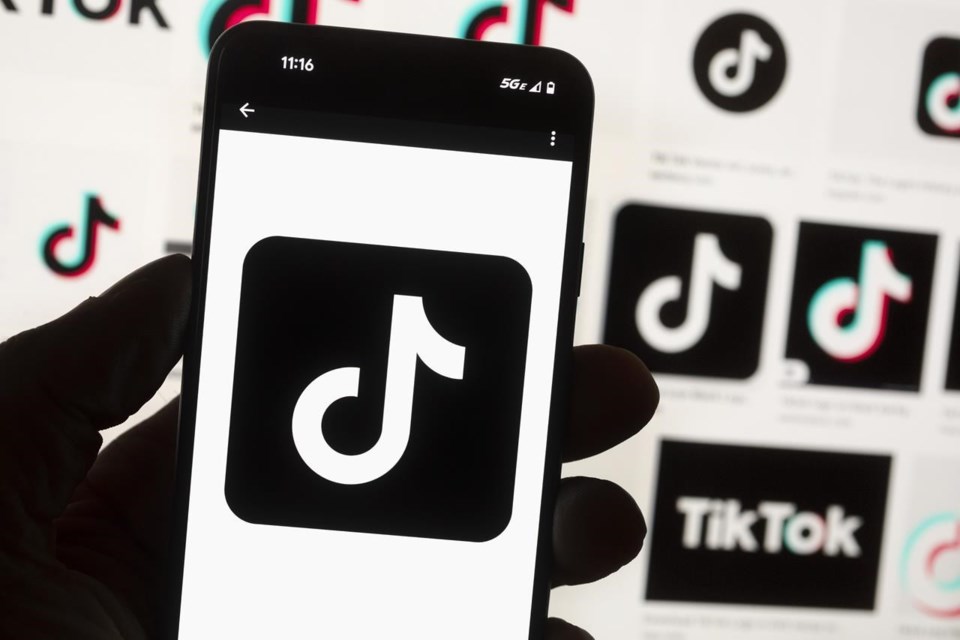TORONTO — An investigation into TikTok launched by Canada's Privacy Commissioner this week is a symptom of growing unrest around data privacy, but also a sign of the extent of geopolitical tensions, academics say.
The investigation revealed Thursday by the federal privacy watchdog and its counterparts in B.C., Alberta and Quebec is meant to delve into whether the video-based social media platform owned by Beijing-based ByteDance complies with Canadian privacy legislation.
Investigators also intend to look into whether the app is obtaining "valid and meaningful" consent when collecting, using and disclosing personal information.
TikTok has long been embroiled in privacy concerns because the Chinese government has a stake in ByteDance and laws allow the country to access user data, but experts see Canada's recent attention to the matter as part of a wider concerns surrounding China and privacy.
"It’s a timely and meaningful way for Canada to enter into a really crucial conversation unfolding in the U.S. the EU and in other parts of the world about incredibly popular and incredibly powerful social media companies," said Sara Grimes, director of the Knowledge Media Design Institute at the University of Toronto, in an email.
"How are they using our data? What are they doing to protect our privacy?"
TikTok, she added, is the focus because the U.S. and the EU have recently banned government staff from using TikTok on work-issued devices.
Asked whether Canada would follow suit, Treasury Board spokesperson Martin Potvin said in an email, "The Government of Canada is assessing the situation, including the legislative announcement by our U.S. allies, and recently the European Commission, and will determine next steps as necessary."
Grimes also noted that there were class-action lawsuits settled last year in both Canada and the U.S., which alleged TikTok was collecting data without consent.¬Ý
"Canada has historically been very slow and hesitant to regulate internet and other digital technologies," Grimes said.¬Ý
"But there’s a shift happening right now — a groundswell of public demand for better protection of user rights, for more transparency from companies and governments about their data practices."
It also comes after the U.S. decision to shoot down a suspected Chinese high-altitude balloon early this month. The balloon crossed into Canadian airspace, but China's government denied it was a spy device.¬Ý
Three other high-altitude objects were downed over North America in the days that followed and since then, the Globe and Mail newspaper has reported the Canadian military detected Chinese monitoring buoys in the Arctic.¬Ý
"There has to be some acknowledgment of the political climate in context that we're debating this (TikTok issue) now," said Vass Bednar, the executive director of the Master of Public Policy in Digital Society at McMaster University.
"And I think asking why now is an awkward question because an investigation like this could happen any time and it probably should happen to other companies on social media."
But Bednar believes the launch of the investigation is unlikely to force Canadians to rethink their use of TikTok. The app is designed to be addictive, so people keep watching videos and posting content, so TikTok likely knows people won't easily abandon it.
¬Ý"Which perhaps makes the threat (of an investigation) more empty," Bednar added.
However, Grimes said the discovery of privacy violations or other issues could shift consumer thinking.
"If the investigation does confirm that TikTok is violating our privacy rights, and/or the privacy rights of teens and children, I think it will definitely sway user habits," she said.¬Ý
"Contrary to popular belief, young people do care a lot about their privacy and how their data is used. And parents care a lot about their children’s data too."
Though ByteDance is not based in Canada, it has an office and staff in Toronto and Grimes said Canada's Personal Information Protection and Electronic Documents Act (PIPEDA) and other privacy laws apply to anyone doing business in the country.
“We welcome the opportunity to work with the federal and provincial privacy protection authorities to set the record straight on how we protect the privacy of Canadians," TikTok spokesperson Danielle Morgan said in an email Thursday, when news of the investigation broke.
However, Canada and the commissions can do little to compel TikTok to comply with the investigation, Grimes said.
"They can publish their results, raise public awareness, and make recommendations to ByteDance for how to bring itself into compliance with PIPEDA and the other Acts involved in this investigation," Grimes said.¬Ý
"But yes, it would be much better if they could also fine offending companies and restrict operations for companies that repeatedly broke Canadian laws." ¬Ý
This report by The Canadian Press was first published Feb. 24, 2023.
Tara Deschamps, The Canadian Press




